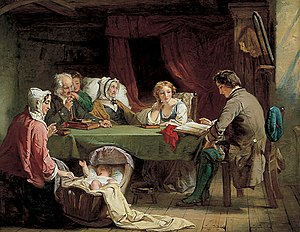
Back سبتية (تعليم مسيحي) Arabic Sabathyddiaeth Welsh Sabbatianer German Sabbatarianism English Sabatista Spanish شنبهداران Persian שמירת שבת בנצרות HE 안식일 엄수주의 Korean Sabatarianisma Malagasy سبت لمانځنه Pashto/Pushto

Sabatarianisme mendorong perayaan Sabat dalam Kekristenan, sesuai dengan Sepuluh Perintah Allah.[1] Perayaan Minggu sebagai hari ibadah dan istirahat adalah bentuk Sabatarianisme hari pertama, sebuah pandangan yang dulunya dipegang oleh denominasi-denominasi nonkonformis, seperti Kongregasionalis, Presbiterian, Methodis, dan Gereja Baptis, serta kebanyakan Gereja Episkopal.[2][3][4][5]
- ^ Carlisle, Rodney P. (17 March 2005). Encyclopedia of Politics
 (dalam bahasa Inggris). SAGE. hlm. 853. ISBN 9781412904094.
(dalam bahasa Inggris). SAGE. hlm. 853. ISBN 9781412904094. Sabbatarianism is the view that insists that one day of each week must be reserved for religious observance as prescribed by the Old Testament Sabbath Law. The sabbatarians' main thesis is simple: The Sabbath is one of the Ten Commandments, and the Ten Commandments do not correspond to a temporary ceremonial law but are to be regarded as eternally significant moral law.
- ^ Heyck, Thomas (27 September 2013). A History of the Peoples of the British Isles: From 1688 to 1914 (dalam bahasa Inggris). Taylor & Francis. hlm. 251. ISBN 9781134415205.
Yet the degree of overlap between the middle class and nonconformity-Baptists, Congregregationalists, Wesleyan Methodists, Quakers, Presbyterians, and Unitarians-was substantial. ... Most nonconformist denominations ...frowned on drink, dancing, and the theater, and they promoted Sabbatarianism (the policy of prohibiting trade and public recreation on Sundays).
- ^ Roth, Randolph A. (25 April 2002). The Democratic Dilemma: Religion, Reform, and the Social Order in the Connecticut River Valley of Vermont, 1791-1850 (dalam bahasa Inggris). Cambridge University Press. hlm. 171. ISBN 9780521317733.
Except for the strong support of Episcopalians in Windsor and Woodstock, the Sabbatarians found their appeal limited almost exclusively to Congregationalists and Presbyterians, some of whom did not fear state action on religious matters of interdenominational concern.
- ^ Vugt, William E. Van (2006). British Buckeyes: The English, Scots, and Welsh in Ohio, 1700-1900 (dalam bahasa Inggris). Kent State University Press. hlm. 55. ISBN 9780873388436.
As predominantly Methodists and other nonconformists, British immigrants were pietists, committed to conversion and the reform of society. They did not separate religion from civil government, bur rather integrated right belief with right behavior. Therefore they embraced reform movements, most notably temperance and abolitionism, as well as Sabbatarian laws.
- ^ O'Brien, Glen; Carey, Hilary M. (3 March 2016). Methodism in Australia: A History (dalam bahasa Inggris). Routledge. hlm. 83. ISBN 9781317097099.
Sabbatarianism: For the non-Anglican Protestants of colonial Queensland (Methodists, Presbyterians, Congregationalists and Baptists), desecration of the Sabbath was one of the great sins of the late nineteenth century.